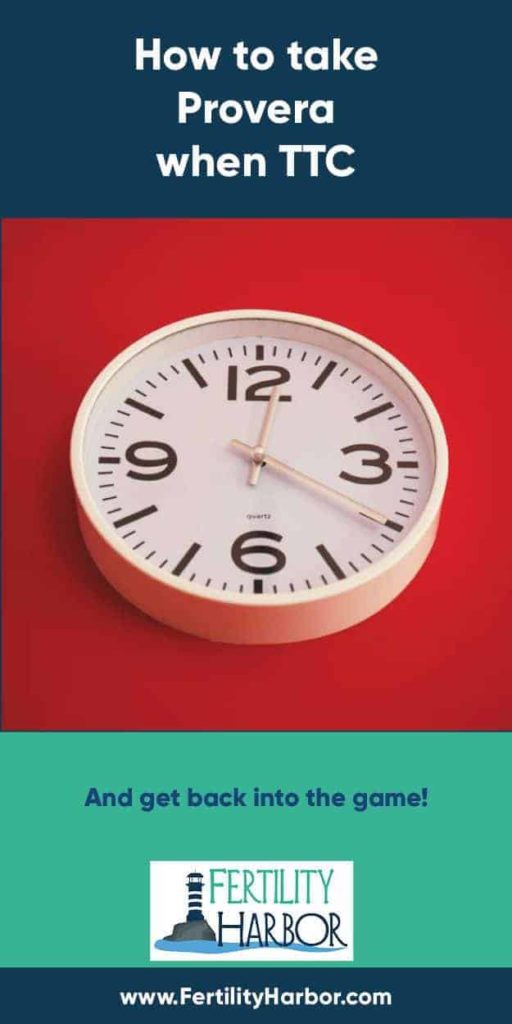This post was reviewed for medical accuracy by Rosalie Gunson, a Certified Registered Nurse Practitioner specializing in fertility care.
When you start any form of fertility treatment (or a new birth control prescription, for that matter), you need to begin with a fresh cycle. Each cycle starts on CD 1, the first day of your period. But what if you don’t get regular periods?
To start a new menstrual cycle, your doctor may prescribe Provera (a synthetic form of progesterone) to bring on a period. Usually, you’ll be asked to take a pill every day for 10 days.
You can expect your period within 14 days of the last pill. That first day of bleeding will be considered CD 1 of the new cycle.
Obviously, a very common reason for women to miss their period is that they are pregnant. You will probably be asked to take a pregnancy test before you start Provera, just to rule out that possibility. You wouldn’t be the first person to show up to a fertility consult already pregnant!
Even if pregnancy is not a priority for you, having periods on a regular basis is a good thing for your overall health. Without regular periods the endometrial lining can get too thick, which increases the risk of uterine cancer.
(This doesn’t apply to birth control methods that involve missing a period for several months, since those hormones keep the lining pretty thin.)
For more info, see the posts Should Regular Periods Be Considered a Vital Sign? and Can You Get Pregnant With a 5 mm Endometrial Lining?
Diagnosing Missed Periods
When you miss periods, the official medical term is amenorrhea. Most women who are having issues with very long, irregular cycles and are trying to get pregnant have secondary amenorrhea.
The “secondary” part refers to the fact that you’ve had your period before. (Primary amenorrhea, in case you’re wondering, is when a girl is at least 16 years old and hasn’t had her first period. That’s much less common.)
What causes secondary amenorrhea? When I started this whole journey I made the mistake of asking Dr. Google, and I ended up diagnosing myself with a bunch of things — including a pituitary tumor!
So I wouldn’t recommend that. Let’s just say there are a number of medical conditions that can mess with your periods.
In the end, I was diagnosed with PCOS, which is a ridiculously common cause of secondary amenorrhea.
Women with PCOS typically pass the progesterone challenge test, which is a fancy way of saying we get our periods when we take Provera.
The Progesterone Challenge Test
The progesterone challenge test (also called the progesterone withdrawal test) helps doctors figure out what is causing the secondary amenorrhea. As tests go, this one is easy: you take Provera as prescribed for a certain number of days and wait for your period. That’s it.
If you DO get your period within two weeks of the last Provera pill, your amenorrhea is probably caused by a lack of ovulation.
If you are trying to get pregnant, your doctor may prescribe Clomid or Femara (letrozole) to fire up your ovaries and get them to ovulate.
Some patients have also had success taking Metformin to regulate their cycles.
If you DON’T get your period within two weeks of the last Provera pill, your doctor may have you do more tests. For example, you may be asked to take estrogen in addition to progesterone to see if that combination induces a period. If it does, your amenorrhea may be caused by low estrogen.
Amenorrhea could have other causes related to your health history. For example, you may have scarring in the uterus or cervix. An intense exercise regimen, sudden and dramatic weight loss, and eating disorders such as anorexia can also cause your period to stop. But it’s not likely that this type of issue would be a surprise to you.
Were you waiting for me to bring up the pituitary tumors? Yes, there are some serious health conditions that cause secondary amenorrhea, but they are rare.
Basic lab work can rule out anything frightening that you may be worried about thanks to Dr. Google. By the time I was prescribed Provera by an ob/gyn, my primary care doctor had already screened me for those sorts of diseases.
Confused about the roles of different medical providers in fertility treatment? Check out my posts Can Your PCP Prescribe Clomid? and Graduating from an RE to an OB for Prenatal Care.
What to Expect from Provera
What can you expect when you take Provera? As with all medications, talk to your doctor and pharmacist if you have specific questions.
In my experience Provera causes bloating and other PMS symptoms, which isn’t surprising. When you do get your period, it could be heavier than you are used to (if you’re used to getting it at all).
I know I said that you should get your period 14 days from the last pill, but that’s an outside number — most women start bleeding within the first week.
While Provera is meant to bring on a period, it won’t really do anything to help with the next cycle. You could end up with another very long cycle and need to take Provera again.
At the start of fertility treatment, my doctor didn’t want my cycles to go longer than 35 days. If the cycle was getting long and the blood work indicated that I hadn’t ovulated, I would take Provera and start over.
If you’ve taken Provera repeatedly to end long cycles and you’re hoping to get pregnant, talk to your doctor about making sure you ovulate. That will get your cycles to a reasonable length, and you can get off the Provera roller coaster.
See my post When Do You Ovulate if You Have 45-Day Cycles? for more information on long cycles.
Provera vs. Depo-Provera
If you’re looking up Provera online, you may see some results that are actually about Depo-Provera, a birth control shot. You might see it referred to as simply “Depo.”
The similarity in the names isn’t a coincidence: both Provera (the pill) and Depo-Provera (the injection) contain medroxyprogesterone acetate, a form of progesterone.
Progesterone does multiple things in our bodies, so it can be prescribed for different purposes.
- As part of a healthy menstrual cycle, progesterone supports the uterine lining in preparation for a possible pregnancy.
- In early pregnancy, progesterone nourishes the new embryo.
- When it’s used in birth control, progesterone stops you from ovulating, thickens the cervical mucus, and thins the uterine lining.
Progesterone-only birth control often keeps women from getting their period for an extended amount of time. The Depo-Provera shot lasts for three months, and women generally don’t have a period for that whole time.
It’s the drop in progesterone that brings on bleeding — that’s why you typically get your period after you’ve taken the last Provera pill.
Progesterone in the Two-Week Wait
While we’re on the topic of progesterone… Some women take progesterone supplements in the two-week wait and/ or the first trimester because low progesterone is associated with early loss. (If you are TTC a Rainbow Baby, you’ll almost definitely be prescribed progesterone.)
Taking supplemental progesterone as part of fertility treatment can be confusing when it comes to taking pregnancy tests. Usually you would try to wait until your missed period to take a home pregnancy test, but taking progesterone in the two-week wait can stop your period from showing up at all.
Don’t worry — the pregnancy test will still be accurate! I’m just warning you not to get your hopes up too much if you’ve been taking progesterone and AF is late. (A trigger shot, though, CAN lead to false positives, as I explain in my post Can Ovidrel Cause a False Positive on a Pregnancy Test?)
If you’ve ever wondered why early pregnancy symptoms are maddeningly close to PMS symptoms, it’s progesterone’s fault. Progesterone rises in the second half of your cycle as your body prepares to either shed the lining or sustain a pregnancy.
Until you miss your period — or go in for a blood pregnancy test — it is pretty hard to tell whether anything you’re feeling is due to a possible pregnancy. See my post Symptom Spotting: How to Tell a BFP from PMS for more on that.
Conclusion
Plenty of women go through fertility treatment without needing Provera, but if you have PCOS or just really long cycles, you will probably encounter it at some point. As long as you remember that it’s the drop in progesterone that causes your period, you should be all set!




 I’m Jenn! Here I am with my beautiful twin boys. My pregnancy was possible thanks to fertility treatment for PCOS.
I’m Jenn! Here I am with my beautiful twin boys. My pregnancy was possible thanks to fertility treatment for PCOS.


